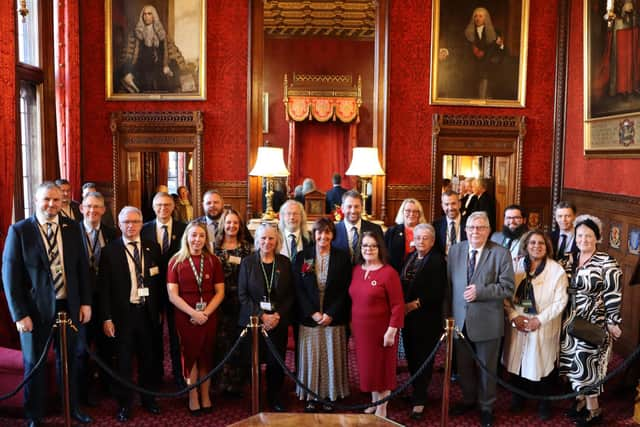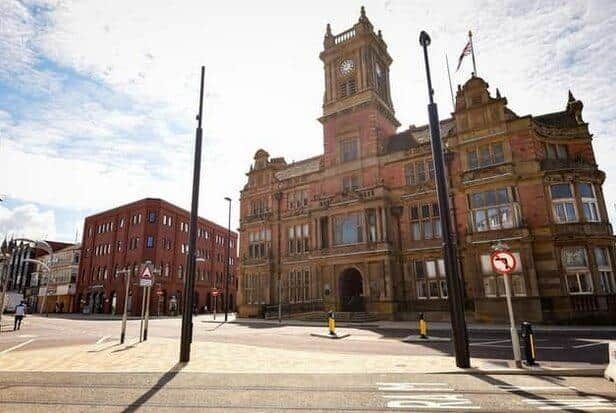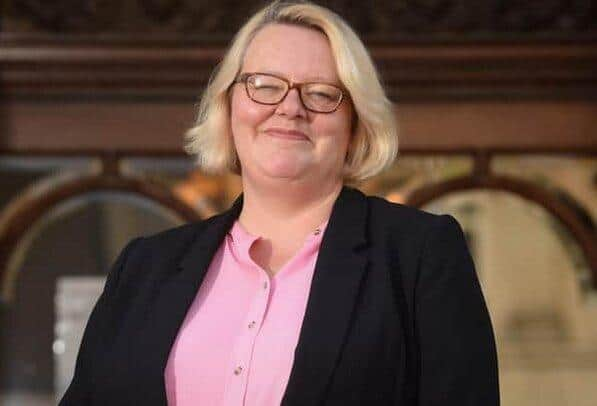Lancashire devolution deal edges closer with Blackpool set to be key player - but what about Fylde and Wyre?
and live on Freeview channel 276
The meeting with mandarins could prove the most significant step so far on Lancashire’s eight-year journey towards gaining the kind of extra powers and cash that have been enjoyed by its neighbours in Greater Manchester and the Liverpool City Region throughout that time.
However, the shape of the proposed deal could yet prove a stumbling block after Lancashire County Council revealed that it would be putting on the table the creation of a combined county authority (CCA). That is a new entity to oversee devolution arrangements in areas like Lancashire, where local government functions are split between county and district councils and there is no appetite to install an elected mayor.
Advertisement
Hide AdAdvertisement
Hide Ad

Under government rules, only so-called top-tier councils can be members of a CCA - in Lancashire’s case, that would mean just the county council and the authorities covering Blackpool and Blackburn with Darwen would sit at the top table.
Lancashire’s dozen district councils – including Fylde and Wyre – would not be part of the formal set-up, although County Hall leader Phillippa Willaimson has said that she is committed to ensuring that they nevertheless have “a voice”.
While the majority of district leaders are so far keeping their powder dry over the plans - including Fylde’s Karen Buckley and Wyre’s Michael Vincent - the response from over in Central Lancashire points towards the re-opening of the divisions that have dogged Lancashire’s devolution attempts for the best part of a decade.
Paul Foster, leader of South Ribble Borough Council, has condemned what he describes as “a breach of trust” by his county counterpart, while Preston City Council leader Matthew Brown has questioned what benefits his area will get if the authority representing it is effectively gagged by the new governance structure.
Advertisement
Hide AdAdvertisement
Hide Ad

The latest bump in the road comes after Lancashire’s 15 councils appeared finally to have smoothed a path towards the additional freedoms and funding that they all seek, but the related terms of which have led to countless local quarrels down the years.
The authorities launched their collective “Lancashire 2050” vision back in November, a plan which set out the challenges and opportunities facing the county in eight key areas – including the economy, housing and transport – and what needed to be done to address and harness them.
That built upon a bold blueprint published back in January 2022, which proposed a devolution package worth £5.6bn to the county, based upon a combination of additional cash and the control it would gain over spending that is currently the preserve of the central government.
Announcing the forthcoming government visit to Lancashire at a meeting of the county council last week, the authority’s leader Phillippa Williamson heralded what she said was a chance to “sell hard” the county’s ambition.
Advertisement
Hide AdAdvertisement
Hide Ad

“We have a great deal to put to government, an opportunity to bring millions of extra pounds in investment and support - and that can be secured, in my view, without the need for local government reform [reducing the number of councils in the area] and without the need to create an elected mayor.
“I want the deal to support much of the great work that this council leads and delivers on, but I also want it to explore other important issues - in particular, how we can address the challenge of economic inactivity in such areas as Blackpool, Blackburn and Preston by leading a trial focused on skills and health inequality, tailored around the specific challenges of these places.
“We know that we have a great offer…and we should look to secure that opportunity now, so that the people and businesses of Lancashire...can benefit from devolution and the power and the resources that we need to deliver a better future for all,” County Cllr Williamson added.
Meanwhile, Lynn Williams, leader of Blackpool Council, said that the people and businesses of the town and Lancashire as a whole “deserve to benefit from devolution”.
Advertisement
Hide AdAdvertisement
Hide Ad

She added: “I welcome any opportunity to discuss how we can make progress. Blackpool Council is eager to work with Lancashire County Council and Blackburn with Darwen Borough Council on plans for a county combined authority as an essential first step in securing a historic first devolution settlement.
“We are clear that we will consider all necessary models to bring the powers and resources that we need to deliver a better future for all,” Cllr Williams said.
Why the wait for a Lancashire devolution deal - and what’s the latest sticking point?
When the government published its Levelling Up white paper in February last year, Lancashire was not listed amongst the nine areas with which Whitehall was next seeking to reach a devolution deal settlement - so the ministerial visit to the county represents a major milestone in its aspirations for more local flexibility and freedom.
However, if the government switch to focusing on Lancashire - announced by Levelling Up Secretary Michael Gove at the Convention of the North event earlier this year - has been born out of the apparent consensus that the county had reached within its own sprawling borders, then it will be important that that unanimity does not crack.
Advertisement
Hide AdAdvertisement
Hide AdWhitehall’s pre-requisite demands of local areas in return for devolution have been ever-shifting in recent years - with one or more of them regularly tying Lancashire’s leaders in knots.
The main sticking points have been the need for an elected mayor, the creation of a combined authority and the prospect of simplifying the county’s complex local government map - potentially by scrapping the 15 existing councils in the region and replacing them with three standalone, or “unitary”, authorities.
In 2021, then Prime Minister Boris Johnson appeared to have squared the circle for places in Lancashire, which want devolution, but not an Andy Burnham-style figurehead to oversee it - and which are also wedded to their existing local government structure. He offered up the idea of seemingly bespoke “county deals” as a way to kickstart devolution in areas where it was otherwise a distant prospect.
While some Lancashire leaders have been more comfortable than others with the concept of an elected mayor - and even merging and reducing the current number of council areas - the county has only been able to progress at the speed of the most circumspect of its constituent parts. In the early days of Lancashire’s devolution pursuit, that included Wyre and Fylde – with the former initially declining to be involved under then leader Peter Gibson and Fylde walking away from the negotiating table in 2017.
Advertisement
Hide AdAdvertisement
Hide AdIn its embryonic devolution proposal in January last year, Lancashire sought to capitalise on the apparent ‘pick n mix’ devolution offer that was then on offer from the government - eschewing the thorny issues of a mayor and the wholesale redrawing of local government boundaries and instead proposing governance arrangements such as a joint committee or statutory board.
The discussions surrounding the proposal were based upon some core principles to which the leaders at the time all put their name.
That meant a one-council-one-vote arrangement – with a two thirds majority required to approve any proposal. Each council – which would be represented by that authority’s leader – would also have had a veto over any proposed project that was in their patch or if their money was required for it or they could demonstrate that it was reasonably likely to have a material impact on their area.
However, when the government’s Levelling Up and Devolution Bill was published last year, the apparent 'anything goes’ approach of Boris Johnson, had been replaced with a more rigid offering. While a suite of deal types and governance arrangements were contained within it, the no-mayor-no-local-government-reorganisation option wanted by Lancashire required the creation of a combined county authority (CCA).
Advertisement
Hide AdAdvertisement
Hide AdAt the government's insistence, district councils such as Fylde and Wyre would not be allowed to be members of it - only the top-tier authorities of the country council, Blackpool Council and Blackburn with Darwen Council.
While there are provisions in the bill to create associate and non-constituent members of CCAs, these would not automatically have voting rights and would require the consent of full members in order to acquire them. It is also unclear whether the government would tolerate a devolved two-tier area like Lancashire simply giving all of its district councils associate membership status by default.
The Gazette understands that at least some district leaders were given just an hour’s notice of the statement made about the CCA at County Hall last week.
Responding to the criticism of the idea, County Cllr Williamson told The Gazette: "The government rules are clear that a combined county authority is to be made up of upper tier local authorities only.
Advertisement
Hide AdAdvertisement
Hide Ad“However, our district councils have a really important part to play and there is a commitment that they will have a voice in any new combined authority.
“They are an integrated and essential part of Lancashire 2050 and have been at the very heart of that project. It is with that ethos we move forward with these discussions.”
Elsewhere, Pendle Council’s leader Asjad Mahmood has said he will be interested in the outcome of the government talks, but has warned of the need to protect Lancashire’s “cherished identity”.
While the other nine district leaders have so far remained silent on the county combined authority plan to be discussed with the government - in spite of being contacted by The Gazette for comment - Lancashire’s devolution hopes could hinge on whether South Ribble and Preston’s leaders are giving voice to a broader disquiet amongst the districts which may yet burst out into the open and divert Lancashire from its longed-for devolution destination once again.